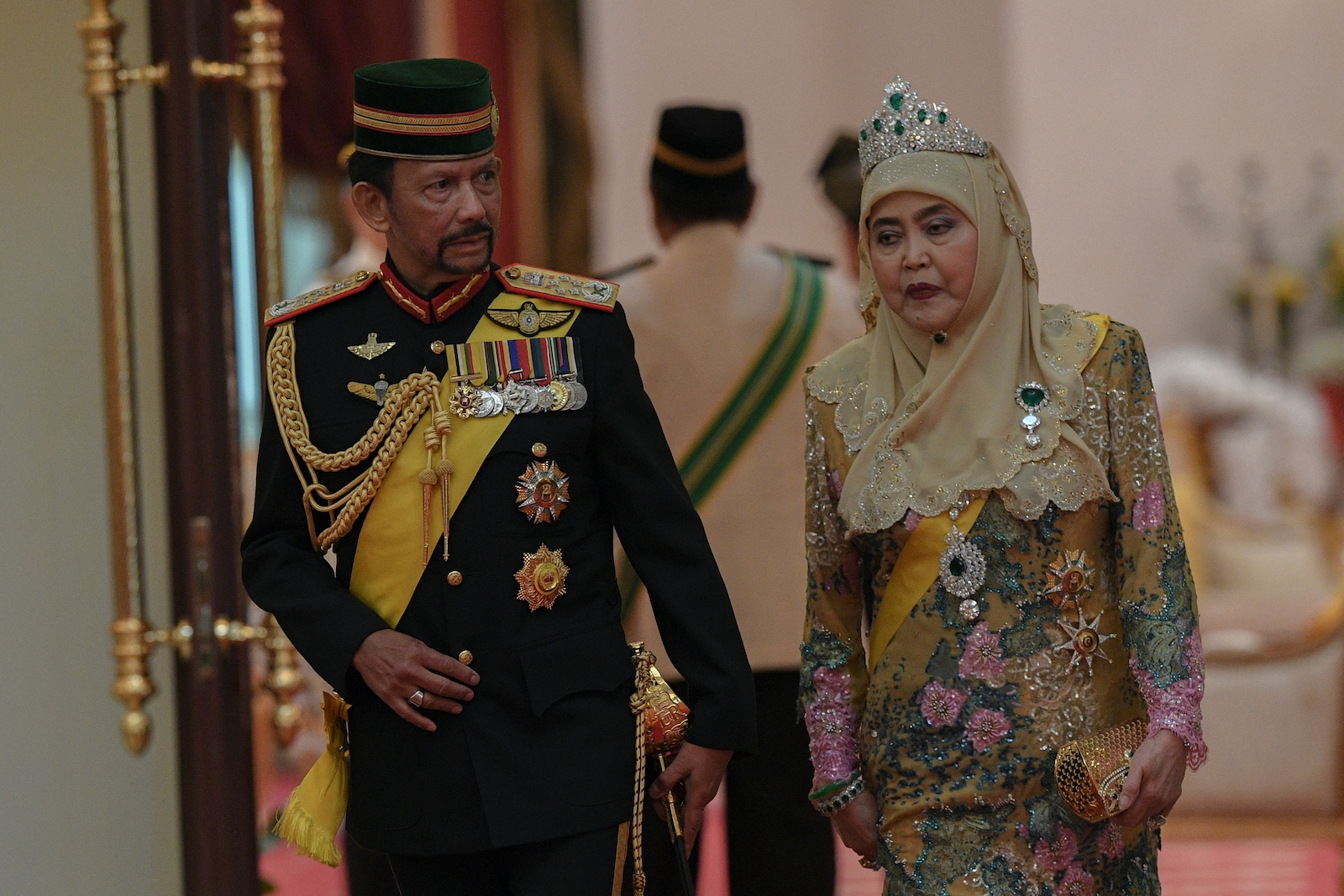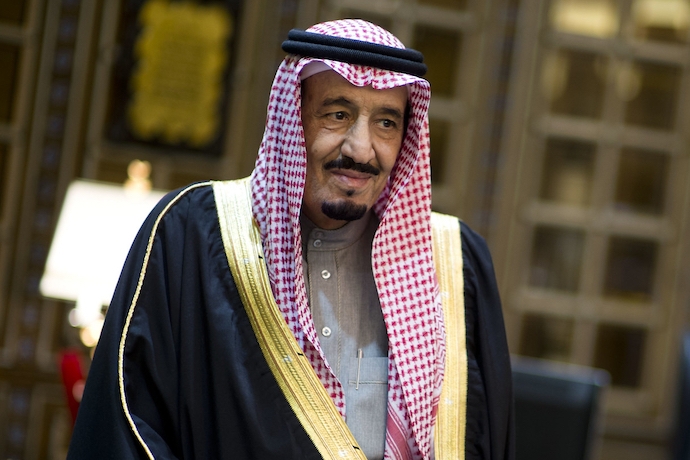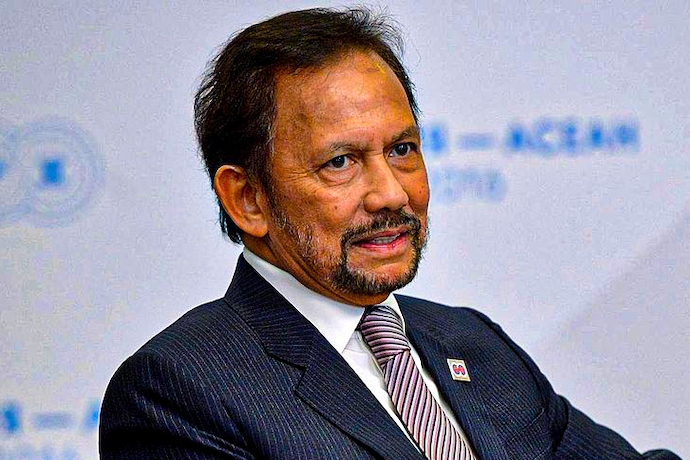
King Salman’s Return to Brunei Two Decades Later
Earlier this month, King Salman bin Abdulaziz al-Saud became the first Saudi monarch to visit the Sultanate of Brunei Darussalam, spending one day in this Southeast Asian Muslim-majority country 20 years after his first visit as the then-governor of Riyadh. As part of his three-week Asia tour, King Salman went to Brunei as well as China, Indonesia, Japan, Malaysia, and the Maldives, with the expressed intention to boost the kingdom’s investment, commercial, security, and cultural relations with Asian states, including four Muslim-majority nations. Although his visit to the monarchy in Borneo was brief, it was significant for several reasons.
The Saudi king met with Haji Hassanal Bolkiah Mu’izzaddin Waddaulah, the sultan of Brunei, who also serves as prime minister, finance minister, defense minister, and supreme commander of the armed forces. Both heads of state agreed to deepen Riyadh and Bandar Seri Begawan’s cooperation on a host of global and regional issues, especially counterterrorism.
The sultan of Brunei thanked King Salman for making his “important and historic visit” and hailed the “continuous, fraternal, friendly and bilateral relations binding” the kingdom and the sultanate. Before the Saudi king departed for his vacation in Bali, the two monarchs agreed to deepen cooperation in the spheres of trade, investment, education, culture, youth, and sports. The Saudi and Bruneian leaders highlighted the importance of strengthening bilateral cooperation in political, military, security, and Islamic affairs.
Shortly before King Salman visited the sultanate, Brunei’s ambassador to Riyadh, Hisham bin Abdul Aziz, stated that the Saudi monarch was visiting the Southeast Asian country due to its important location in the Asia Pacific and its membership in both the Association of Southeast Asian Nations (ASEAN) and the Jeddah-headquartered Organization of Islamic Cooperation (OIC). The ambassador asserted that the two countries share views on international issues, have common visions, and are united in their rejection of extremism.
This rhetoric may seem to be standard diplomatic prose. Yet Saudi Arabia and Brunei are indeed aligned, and a growing relationship is bringing the kingdom and the sultanate closer to the point that Saudi Arabia can influence Brunei media. Five months ago, this was clear when Saudi Arabia’s unhappiness with the Bruneian press’ reporting on Hajj politics resulted in the sultan shutting down The Brunei Times, which claimed that Saudi officials were raising Hajj and Umrah visas because of the kingdom’s economic problems.
Saudi Arabia-Brunei relations
The history of the kingdom and the sultanate’s relationship took off gradually and modestly. Saudi Arabia opened its embassy in Brunei at the level of chargé d’Affairs in 1995. Two years later, King Salman, as the then-governor of Riyadh, became the first Saudi royal to visit Brunei. In 2001, the two governments upgraded relations and signed an agreement of cooperation in tourism and joint investments in gas, oil, petrochemicals, health, agriculture, and livestock. Six years later the agreement was finalized, leading to the development of an increasingly positive bilateral relationship.

Since the establishment of diplomatic relations 22 years ago, Sultan Bolkiah has visited Saudi Arabia on two occasions, meeting King Fahd in 1998 and King Abdullah in 2011. These two trips to the kingdom came at pivotal times in Brunei’s development. The sultan’s meetings with both Saudi monarchs focused on Islamic and global issues. During the 2011 meeting, Riyadh sought Bruneian investment in one of the “Six Saudi Economic Cities” plans as part of then-King Abdullah’s economic program.
Saudi Vision 2030 vs. Vision Brunei 2035
Saudi Arabia and Brunei’s plans for transforming their economies away from energy dependence are similar. Like Saudi Arabia, Brunei’s long-term economic challenge is to decrease its reliance on the gas and oil sectors, which are responsible for 98% and 93% of national exports and government revenues, respectively. In total, 70% of the country’s exports are to India, Japan, South Korea, and Thailand. Natural gas-thirsty Japan tops the list, receiving 36% of Brunei’s exports.
Outside of gas and oil, there is little to Brunei’s economy. Although most estimates suggest that Brunei’s gas and oil exports will hold steady until at least 2030-40, the country is committed to an economic diversification agenda as outlined in Vision Brunei 2035. This plan, unveiled in 2008, seeks to capitalize on the sultanate’s potential to become a major Islamic finance hub in the Asia Pacific, or an “Islamic Singapore,” which requires securing support from Indonesia and Malaysia.
Tourism is another important pillar of Vision Brunei 2035. From 2002-13, Brunei’s tourism industry was the only one in Southeast Asia that did not grow. Unquestionably, the global media’s coverage of Islamic law implementation contributed to the ossified tourism industry’s inability to lure more tourists, both Muslim and non-Muslim, who have opted to spend their vacations in other parts of Southeast Asia such as Indonesia and Malaysia where the practice of Islam is more tolerant. In Brunei, there are severe restrictions on non-Muslims’ rights to practice their own religion and, under the blasphemy law, insulting the Quran or declaring one’s apostasy are crimes punishable by death. Nonetheless, the Bruneian leadership is determined to make their country a more popular tourist destination.
Nearly a decade after launching Vision Brunei 2035, the sultanate’s economic system is demonstrating signs of strain. Of the country’s 420,000 citizens, those who work are mainly in the public sector, which means that Brunei’s civil service will suffer the most as the sultanate’s economic restructuring occurs. This same phenomenon is also taking place in Saudi Arabia. Brunei’s youth unemployment rate has increased in recent years, largely due to many youths waiting for higher-ranking public jobs, which results in social restlessness among young citizens. Brunei’s domestic situation is similar to some of the discontent seen in Saudi Arabia today.
New geoeconomic realities in Southeast Asia
By pulling the United States out of the Trans-Pacific Partnership (TPP), one of President Donald Trump’s first moves in the Oval Office was to null what was to be the world’s largest free trade agreement. As a result, China’s economic poise in the region can only expand further. Brunei, having been a member of the TPP as well as Beijing’s alternative, the Regional Comprehensive Economic Partnership (RCEP), is likely to shift toward China’s geoeconomic influence. Officials in Bandar Seri Begawan and other Southeast Asian states, no longer able to count on Washington to promote a regional trade bloc aimed at countering Beijing’s influence in the global economy, will come to view China as the “driver of trade liberalization” in the 21st century.
For Saudi Arabia, which has an important role to play in China’s “One Belt, One Road” (OBOR), Beijing’s growing power in the global economic order is a valuable opportunity. Having redirected its oil sales to Asia (chiefly China) and away from the West at the start of the century, the kingdom has already made its geoeconomic pivot to the East. Recognizing the significance of the TPP’s demise for Brunei and other Asian countries, King Salman’s visit to the region came at an opportune time in which ASEAN members are seeking new partners while cautiously eyeing the potential for RCEP to deepen their links with the rest of the world via OBOR and other emerging Chinese-run trade corridors.
Islam, oil, and Iran
King Salman’s trip to the sultanate came with much symbolism. As the first Saudi monarch to visit Brunei, he sent an important message that he sees the Sultan of Brunei as a fellow royal and that he approves of his religious legitimacy as the leader of his country’s citizens. Brunei has a special geostrategic and religious position in Borneo and the greater Asia Pacific region. Brunei’s authorities impose a version of the Islamic law that is far harsher than what their Malaysian and Indonesian counterparts enforce, and the country is much more in sync with Saudi Arabia in terms of legal and religious strictures and hierarchy.
The sultan of Brunei decided to implement Islamic law in October 2004 for several reasons. First, he wanted to bring a new stability to Brunei, which the sultan saw as a requirement for protecting society from outside ills such as drugs and crime. Second, the sultan thought that by introducing Islamic law Brunei could attract more foreign investment from the Gulf Cooperation Council (GCC). A third reason was the regional security environment with al-Qaeda running rampant in Saudi Arabia as well as the Asia Pacific. At this point, Bandar Seri Begawan sought to seek a closer relationship with its Muslim neighbors and Saudi Arabia to prevent any jihadist attack on Bruneian soil.

Brunei’s Islamic law was rolled out in three phases. The first phase focused on family and community. The second phase focused on property offenses. The third phase instituted punishments for adultery, abortion, homosexuality, and blasphemy. It is important to note that roughly one-third of Brunei’s population is non-Muslim, made up of Hindu and Chinese communities. The country’s religious minorities, including Buddhists and Christians who represent 15-20% of the sultanate’s population, are adjusting to the new legal regime in the sultanate which, for example, requires Christians to notify the authorities of their Christmas celebrations and confine such traditions to their communities.
Like Saudi Arabia, Brunei has received ample criticism from activists across Western societies. Also, in Southeast Asia many voices condemn the expansion of Saudi influence in the region, maintaining that Wahhabism does not sit well in countries like Malaysia and Indonesia. Yet for Saudi Arabia, a conservative Sunni Muslim country such as Brunei offers the kingdom an opportunity to further use its position in the Muslim world to deepen its political, cultural, and religious links.
The kingdom is also seeking to strengthen its leverage within the Organization of the Petroleum Exporting Countries (OPEC) and work to make the cartel as influential in global oil markets as possible. Of course, with increased competition from non-OPEC oil producers, both the cartel itself and Saudi Arabia have lost leverage in the international oil market. Enhancing ties with more members of the cartel in terms of market share is a priority for Riyadh as it seeks to make its members more disciplined at a time when some in OPEC are considering the benefits of breaking away. The prospects of OPEC falling are deeply unsettling to both Saudi Arabia and Brunei as such a development would lead to oil prices falling based on a supply/demand equilibrium. Although OPEC’s fall would unquestionably create some winners with petroleum becoming cheaper, the Saudis would not benefit from the cartel’s breakup. For Riyadh, securing closer ties in the energy sector with Brunei factors into Saudi Arabia’s agenda within OPEC.
The Saudi-Iranian rivalry, which visibly manifests itself in Middle Eastern countries where there are deep sectarian divisions, reverberates as far as the Asia Pacific. King Salman’s visit to Brunei and other Muslim nations in the region was in no small part aimed at deterring the growth of such countries’ relations with Tehran. In March 2016, Iranian Foreign Minister Mohammad Javad Zarif visited the sultanate to discuss opening up Bruneian-Iranian trade following the lifting of sanctions.
For Brunei, Iran’s economy of $400 billion and large population of 80 million with a highly educated middle class offers ample opportunity for investment. As Riyadh associates Iran’s reintegration with the global economy with Tehran’s increasingly emboldened foreign policy in the Arab world, which Saudi Arabia and some other GCC members view as the number regional threat, the kingdom will certainly use its influence in Southeast Asia to try and veer these countries away from Iran’s economic lure.
Security relationship
In 2015, King Salman received Brunei’s Lieutenant General Dato Abdul-Aziz Mohammed Tameet to discuss defense cooperation. In March 2016, Brunei’s Commander of Armed Forces Major General Baheen Muhammad Tawih attended the North Thunder military exercise in Saudi Arabia. Brunei’s defense capabilities are dedicated to maritime security and it has maritime disputes with China in the South China Sea. As such, Saudi defense ties with Brunei is a recent development that is slated to grow, given the kingdom’s interest in becoming an increasingly influential actor in Indian Ocean defense issues as related to protecting trade routes from piracy and counterterrorism initiatives. Both Brunei and Saudi Arabia have seen added investment from the United Kingdom in terms of British defense assets and positions of support.
The next step in upgrading Riyadh and Bandar Seri Begawan’s security relationship would be to have Brunei join the Saudi-led Islamic Military Alliance to Fight Terrorism (IMAFT). When Saudi Arabia’s Deputy Crown Prince Mohammed bin Salman unveiled this now-41 nation alliance in December 2015, Brunei was not listed as a member. However, the following month, Prince Mohammed met with Brunei’s deputy defense minister to discuss the sultanate’s participation in IMAFT. Saudi armed forces are now visiting Brunei armed forces on study missions. The Saudi and Bruneian leaders agreed to enhance cooperation within the framework of the Organization of Islamic Cooperation to advance their countries’ interests and those of the Muslim world, stressing “the need to reject extremism and combat terrorism in all its forms and manifestations, whatever its source.”
In light of recent developments in the Levant and North Africa, where the Islamic State (IS) is losing and/or has lost its strongholds in Mosul, Raqqa, and Sirte, security officials across Southeast Asia are increasingly alarmed by the potential for more jihadists from the region to return to their home countries. According to Philippine President Rodrigo Duterte, the Islamic State is determined to establish a caliphate that encompasses land in his country, as well as Brunei, Malaysia, and Indonesia. As battle-hardened fighters and experienced with new skills, IS militants from Indonesia, Malaysia, and other Asia Pacific states will seek to relocate to new corners of the world to advance their nihilistic global cause, following the caliphate’s military losses in the Levant and North Africa. So, Brunei will be keen to seek new partners in international counterterrorism efforts.
To protect its image and unite the Muslim world behind the kingdom’s IMAFT, Saudi Arabia is seeking to convince Southeast Asians that Riyadh is truly committed to its security. In terms of Saudi Arabia’s own security interests, working with security apparatuses across the Asia Pacific region is valuable given the threat of Southeast Asian supporters of IS entering the kingdom as low-skilled foreign workers, from where they can launch attacks. Jihadist terrorists coming to the kingdom from the Asia Pacific region as hajjis (pilgrims) represent another threat. In September 2016, Al Arabiya reported on Saudi authorities arresting a Bruneian pilgrim on terrorism charges.
Outlook
King Salman’s three-week Asia tour takes place at a pivotal time in the kingdom’s history. Determined to continue his predecessor’s “Look East” approach to trade and investment, the king’s visit to six Asian countries heavily factors into Riyadh’s quest to secure more support for Vision 2030 from major economic powers in all corners of the world. Unquestionably, regarding Vision 2030, the most important legs of the Saudi monarch’s tour were China and Japan. Compared to these two Asian powerhouses, Brunei has relatively little to offer Saudi Arabia in terms of cooperation for Saudi Arabia’s economic transformation agenda.
Yet the symbolism and religious undertones of King Salman’s meeting with the sultan of Brunei weigh into the kingdom’s grander plans for protecting Saudi Arabia and its allies from trans-regional threats. The kingdom and the sultanate find themselves in the same boat in many ways. Both are deeply conservative Sunni Muslim countries often at odds with Western values that face similar economic dilemmas stemming from dependency on their hydrocarbon sectors and the rise of extremists such as IS and al-Qaeda.
As the Custodian of the Two Holy Mosques, the Saudi king’s visit to Brunei to meet with the sultanate’s ruler was about the ruler of the Saud’s kingdom conferring legitimacy upon Sultan Bolkiah. ASEAN members like Brunei usually only fit into an analysis of the Saudi-Iranian rivalry as an afterthought. Yet as the leadership in Tehran seeks to expand Iranian trade ties with Southeast Asian nations, particularly the Muslim-majority ones, Saudi Arabia is unsettled by several ASEAN members’ expressed willingness to do business with Iran. By visiting Brunei, the king is giving robust support to the sultan’s rule. King Salman’s trip was largely aimed at keeping the country within Saudi Arabia’s sphere of influence and at a distance from Iran’s.
Building on his first trip to Brunei 20 years ago, King Salman’s visit to a Muslim-majority located in a strategically prized section of the South China Sea was an important gesture. With Brunei in a region where violent Islamist extremists are making their presence felt and as ASEAN member states are growing increasingly alarmed by the threat of more IS fighters relocating from the Levant to the Asia Pacific region, it would be logical to assume that counterterrorism cooperation will play a greater role in shaping the Riyadh-Bandar Seri Begawan relationship. King Salman’s return to the sultanate was politically important for Brunei’s government as it seeks to increase its religious legitimacy by engaging with the Custodian of the Two Holy Mosques.
Looking ahead, it would only be logical to assume that the kingdom and the sultanate will bring their bilateral relationship to new heights as both nations face the challenge of transforming their economies away from oil and gas, and protecting their monarchies from IS and other trans-regional threats.


